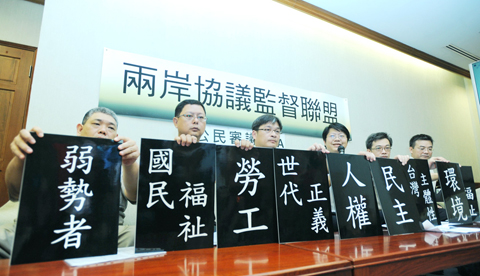More than 30 non-profit organizations yesterday joined a mock review of the Economic Cooperation Framework Agreement (ECFA) in the legislature yesterday, in an attempt to increase pressure on lawmakers to hold a substantive review of the controversial trade pact.
The mock review included representatives from human rights, labor and government watchdog organizations who later issued a joint statement saying that they were attempting to do the job that the legislature was supposed to carry out.
“Cross-strait agreements should be monitored on the basis of [looking after] Taiwan’s democracy, human rights ... environmental [issues] ... and sovereignty,” the statement said.

PHOTO: WANG YI-SUNG, TAIPEI TIMES
It added that they would compile the viewpoints discussed during the review and forward them to the Chinese Nationalist Party (KMT) and Democratic Progressive Party (DPP) caucuses.
The DPP caucus has boycotted the ECFA review in protest against a decision by the KMT caucus to bypass a committee review and send it straight to a second reading.
The group yesterday blasted the KMT’s move, saying it was “clearly illegal.”
Lai Chung-chiang (賴中強), convener of the session, said the recordings from the legislative session on July 8 clearly showed some DPP lawmakers rejecting a proposal to send the pact directly to a second reading.
“But the legislative speaker did not even hold a vote on it and directly announced the verdict ... there are clearly some defects in the process,” he said.
Suggestions later compiled from the session’s comments include correcting the legislative record to state that some legislators did express their opposition to sending the pact directly to a second reading, when lawmakers meet again next month. Another suggestion was to send it back to the legislative committee for further review and to hold public hearings.
Tsai Chi-hsun (蔡季勳), an official with the Taiwan Association for Human Rights, denied that the mock review was politically motivated.
“Our aim is to monitor cross-strait agreements in the long-term. We are not involved with any particular political party and are non-partisan,” he said.

Alain Robert, known as the "French Spider-Man," praised Alex Honnold as exceptionally well-prepared after the US climber completed a free solo ascent of Taipei 101 yesterday. Robert said Honnold's ascent of the 508m-tall skyscraper in just more than one-and-a-half hours without using safety ropes or equipment was a remarkable achievement. "This is my life," he said in an interview conducted in French, adding that he liked the feeling of being "on the edge of danger." The 63-year-old Frenchman climbed Taipei 101 using ropes in December 2004, taking about four hours to reach the top. On a one-to-10 scale of difficulty, Robert said Taipei 101

Nipah virus infection is to be officially listed as a category 5 notifiable infectious disease in Taiwan in March, while clinical treatment guidelines are being formulated, the Centers for Disease Control (CDC) said yesterday. With Nipah infections being reported in other countries and considering its relatively high fatality rate, the centers on Jan. 16 announced that it would be listed as a notifiable infectious disease to bolster the nation’s systematic early warning system and increase public awareness, the CDC said. Bangladesh reported four fatal cases last year in separate districts, with three linked to raw date palm sap consumption, CDC Epidemic Intelligence

Two Taiwanese prosecutors were questioned by Chinese security personnel at their hotel during a trip to China’s Henan Province this month, the Mainland Affairs Council (MAC) said yesterday. The officers had personal information on the prosecutors, including “when they were assigned to their posts, their work locations and job titles,” MAC Deputy Minister and spokesman Liang Wen-chieh (梁文傑) said. On top of asking about their agencies and positions, the officers also questioned the prosecutors about the Cross-Strait Joint Crime-Fighting and Judicial Mutual Assistance Agreement, a pact that serves as the framework for Taiwan-China cooperation on combating crime and providing judicial assistance, Liang

US climber Alex Honnold left Taiwan this morning a day after completing a free-solo ascent of Taipei 101, a feat that drew cheers from onlookers and gained widespread international attention. Honnold yesterday scaled the 101-story skyscraper without a rope or safety harness. The climb — the highest urban free-solo ascent ever attempted — took just more than 90 minutes and was streamed live on Netflix. It was covered by major international news outlets including CNN, the New York Times, the Guardian and the Wall Street Journal. As Honnold prepared to leave Taiwan today, he attracted a crowd when he and his wife, Sanni,